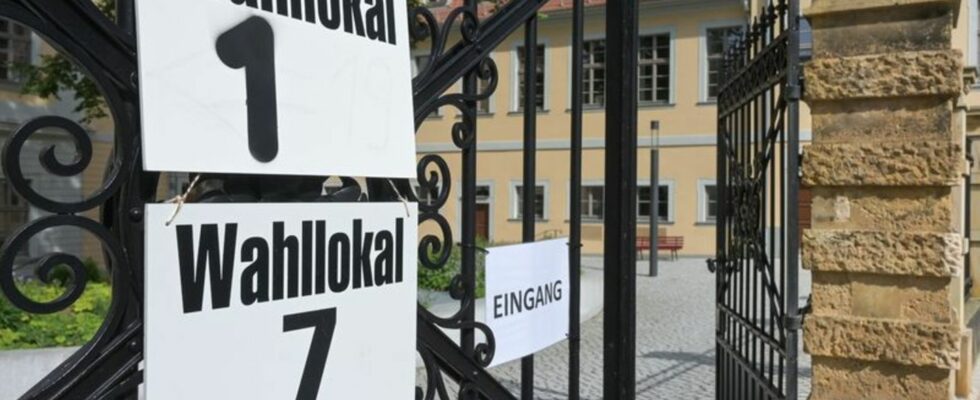Local elections
Thuringian: No victory for the AfD at first attempt
The counting of votes after the local elections in Thuringia is underway. Photo
© Heiko Rebsch/dpa
The Höcke-AfD wants to conquer district offices and town halls – and position itself for the state elections. According to interim results, this is not succeeding.
In the Thuringian district and mayoral elections, the According to interim results, the AfD has little chance of winning district offices and town halls in the first attempt. However, run-off elections with AfD participation are looming in several regions. This means that the party of right-wing extremist Björn Höcke still has a chance of winning top municipal offices in the Free State.
This applies, for example, to the districts of Sömmerda and Wartburgkreis, where the CDU and AfD candidates were close together after half of the voting districts had been counted. The situation was similar in the districts of Altenburger Land and Kyffhäuser, where run-off elections between incumbents and AfD candidates are possible. The local elections are seen as the first test of the mood, especially for the state elections on September 1. Run-off elections are planned for June 9 – at the same time as the European elections.
Voting took place in 13 districts for district administrators, of which the CDU has so far provided eight. Some long-standing CDU office holders, including Germany’s longest-serving district administrators in the districts of Eichsfeld and Greiz, did not run again. In the district of Sonneberg, the first AfD district administrator nationwide was elected in 2023. After that, the party, which is classified as definitely right-wing extremist by the state’s Office for the Protection of the Constitution in Thuringia, failed in the runoff elections in further municipal votes in the Free State.
1.74 million Thuringians also voted for the mayors and lord mayors in 94 cities as well as the candidates for 17 district councils and more than 600 city and municipal councils. 16 and 17 year olds were also able to vote.
Neo-Nazi makes it to the runoff
In the southern Thuringian district of Hildburghausen, a right-wing extremist narrowly made it into the runoff election for the post of district administrator. The nationally known neo-Nazi Tommy Frenck received 24.9 percent of the vote, narrowly beating the CDU candidate Dirk Lindner. Sven Gregor, who ran for the Free Voters in the Hildburghausen district and received 42.4 percent of the vote in the first round, is considered to be a good candidate for the top job in the district administrator’s office.
Frenck’s candidacy had already caused irritation before the election. According to Thuringia’s local election law, no one can be elected district administrator or mayor “if they do not guarantee that they will at all times support the free democratic basic order in the sense of the Basic Law and the state constitution.”
According to the 2022 Thuringian Constitutional Protection Report, Frenck’s voting group “Alliance for the Future of Hildburghausen” (BZH) “developed into the leading neo-Nazi group in the Hildburghausen district”. Nevertheless, the extremist was approved as a candidate by the electoral committee.
Frenck became known nationwide because he organized a series of large neo-Nazi concerts, some of which were attended by right-wing extremists from several European countries. The report by the Office for the Protection of the Constitution states: “His business activities and his political activities now form a worrying symbiosis of right-wing extremist ideology and his own economic interests.”
The AfD is ahead in polls
One day before the election, hundreds of people took to the streets across Thuringia to demonstrate for a cosmopolitan Thuringia and against right-wing extremism. According to police, up to 2,000 people took part in a rally in Erfurt alone. Voter turnout was 46.2 percent by 4 p.m.
In polls for the state election, the AfD is currently at 30 percent, despite losses, far ahead of the CDU with around 20 percent and the Left Party of Prime Minister Bodo Ramelow (Left) with 16 percent. Thuringia has been governed by a red-red-green coalition since 2014, but since 2020 it no longer has its own majority in the state parliament.

